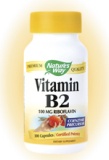Riboflavin (vitamin B2) is found in a variety of food sources, however, in small amounts. The most abundant sources of this vitamin are milk, milk products and liver. Other food sources of riboflavin are oysters, lean meat, green leafy vegetables, mushrooms, asparagus, broccoli, avocados, Brussels sprouts and salmon. rewer’s yeast is the richest natural source of vitamin B2. Liver, tongue, and other organ meats are also excellent sources. Oily fish, such as mackerel, trout, eel, herring, and shad, have substantial levels of riboflavin, too. Nori seaweed is a fine source. Milk products have some riboflavin, as do eggs, shellfish, millet and wild rice, dried peas, beans, and some seeds such as sunflower.
High levels of vitamin B2 are found in cheese, egg yolks, almonds, organ meats, whole grains, wild rice, soybeans, milk, spinach, mushrooms, almonds, and poultry. The best sources of riboflavin include brewer's yeast, almonds, organ meats, whole grains, wheat germ, wild rice, mushrooms, soybeans, milk, yogurt, eggs, broccoli, brussel sprouts, and spinach. Flours and cereals are often fortified with riboflavin. Brewer’s yeast is the richest natural source of vitamin B2. Liver, tongue, and other organ meats are also excellent sources. Oily fish, such as mackerel, trout, eel, herring, and shad, have substantial levels of riboflavin, too. Nori seaweed is also a fine source. Milk products have some riboflavin, as do eggs, shellfish, millet and wild rice, dried peas, beans, and some seeds such as sunflower. Other foods with moderate amounts of riboflavin are dark leafy green vegetables, such as asparagus, collards, broccoli, and spinach, whole or enriched grain products, mushrooms, and avocados. Lower levels of vitamin B2 are found in cabbage, carrots, cucumbers, apples, figs, berries, grapes, and tropical fruits.
Other foods with moderate amounts of riboflavin are dark leafy green vegetables, such as asparagus, collards, broccoli, and spinach, whole or enriched grain products, mushrooms, and avocados. Lower levels of vitamin B2 are found in cabbage, carrots, cucumbers, apples, figs, berries, grapes, and tropical fruits. Riboflavin is reported to be stable to heat, therefore, it is least likely lost during cooking. However, baking soda is reportedly destructive to the vitamin stability when it is added during cooking. In addition, because this vitamin is sensitive to light, the storage of such foods in clear containers may destroy the vitamin. |
